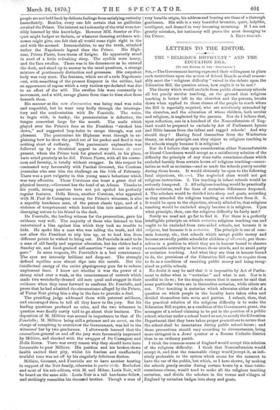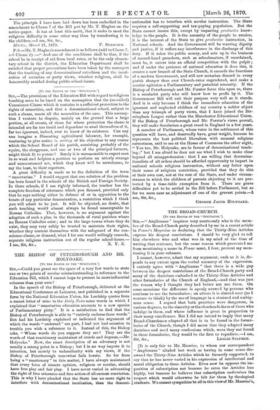LETTERS TO THE EDITOR.
THE "RELIGIOUS DIFFICULTY" AND THE EDUCATION BILL.
[TO THE Eorroa OF THE "SPECTATOR?] SIR,—The Government having expressed their willingness to place such restrictions upon the action of School Boards as shall reason- ably meet the "religious difficulty" raised in the debate upon the Education Bill, the question arises, how ought it to be met ?
The theory which would exclude from public elementary schools all but purely secular teaching, on the ground that religious teaching is better left to the churches and the parents, breaks down when applied to those classes of the people to reach whom the Bill is especially required, who are notoriously unreached by the churches, and the education of whose children, both secular and religious, is neglected by the parents. Nor do I believe that, upon reflection, one in a hundred of the Nonconformists of Eng- land would be prepared to exclude by Ad of Parliament hymns and Bible lessons from the infant and ragged schools! And why should they ? Having freed themselves from the Warburton theory, on what principle can they object to religious teaching in the schools simply because it is religious ?
Nor do I believe that upon consideration either Nonconformists or liberal Churchmen would accept as a satisfactory solution of the difficulty the principle of any time-table conscience-clause which excluded harshly from certain hours all religious teaching—unsec- tarian as well as sectarian—and so made the schools purely secular during those hours. It would obviously be open to the following fatal objections, viz. :-1. The neglected class would not get religious instruction. 2. The teaching in infant schools would be seriously hampered. 3. All religious teaching would be practically made sectarian, and the lines of sectarian differences deepened. 4. The scholars would be divided into sheep and goats, according as they attended the religious teaching or withdrew from it. 5. It would be open to the objection, already alluded to, that religious teaching would be excluded simply because it is religious. Upon what principle, then, can the religious difficulty be fairly met?
Surely we need not go far to find it. For there is a perfectly intelligible principle on which sectarian religious teaching can and ought to be excluded from rate-aided schools, not because it is religious, but because it is sectarian. The principle is one of com- mon honesty, viz., that schools which accept public money and become avowedly public schools for children of all creeds, put them- selves in a position in which they are in honour bound to observe a reasonable neutrality as between those creeds, and to avoid party or sectarian teaching. And what they are thus in honour bound to do, the provisions of the Education Bill ought to require them to do as a condition of receiving public money and being recog- nized as public schools.
No doubt it may be said that it is impossible by Act of Parlia- ment to define what is " sectarian " and what is not. Nor is it needful to do so ; for the simple reason that it cannot be said that some particular views are in themselves sectarian, while others are not. That teaching is sectarian which advocates either side of a question on which people in the locality have taken sides and divided themselves into sects and parties. I submit, then, that the practical solution of the religious difficulty is to make the Education Bill require, as a condition of the Government grant, the managers of a school claiming to be put in the position of a public school, whether under a school board or not, to satisfy the Education Department that they have taken proper precautions to secure that the school shall be unsectarian during public school-hours ; and those precautions should vary according to circumstances, being more stringent in a Jews' quarter or a Roman Catholic district than in an ordinary parish.
I think the common-sense of England would accept this solution of the religious difficulty. I think that Nonconformists would accept it, and that the reasonable clergy would :accept it, as infi- nitely preferable to the system which seems for the moment to have the ear of the public, but which, as I have shown, by making the schools purely secular during certain hours by a time-table- conscience-clause, would tend to make all the religious teaching sectarian, and divide the scholars in the towns and villages of England by sectarian badges into sheep and goats.
The principle I have here laid down has been embodied in the amendment to Clause 7 of the Bill put by Mr. T. Hughes on the notice-paper. It has at least this merit, that it seeks to meet the religious difficulty in some other way than by transferring it to the children.—I am, Sir, &c.,
P.S.—Mr. T. Hughes's amendment is as follows (add to Clause 7, sub Clause 2) :—" And one of the conditions shall be that, if the school be in receipt of aid from local rates, or be the only elemen- tary school in the district, the Education Department shall be satisfied that proper precautions have been taken by the managers that the teaching of any denominational catechism and the incul- cation of sectarian or party views, whether religious, shall be honourably avoided during public school-hours.



































 Previous page
Previous page